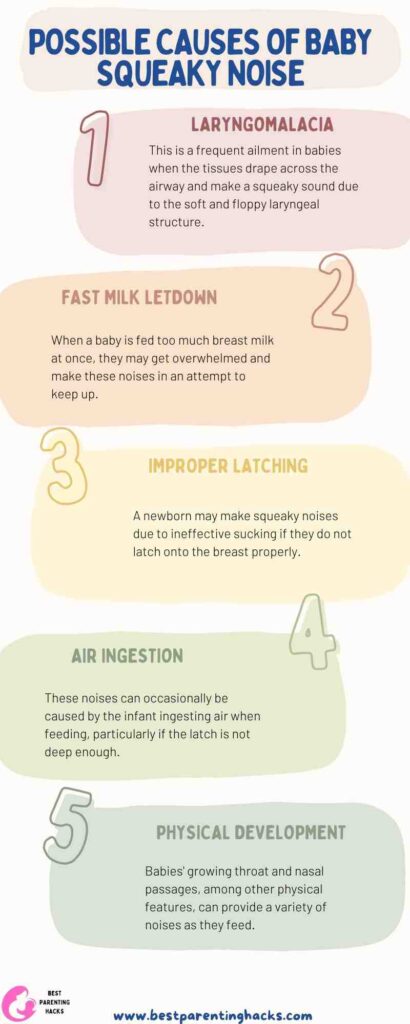Table of Contents
The odd noises your baby makes might be one of the many unusual sensations and surprises that come with breastfeeding. As a parent, I can still recall the moment I heard those squeaky sounds when my child was being nursed. At first, it made me worry: was my child okay? What sound were they producing? This is a common experience for many new parents, raising both interest and concerns. The sound, which is usually a high-pitched wheeze or squeak, can happen when the infant is sleeping as well as during nursing. Parenting books don’t always prepare you for things like this, and they might leave you in the dark about what to do.
These squeaky noises are often a normal component of nursing, based on my experience and knowledge. Among other things, they are frequently caused by the baby’s undeveloped larynx or a sudden drop in milk supply. Although it’s crucial to keep an eye out for any associated symptoms that could point to a concern, these noises are mostly simply an amusing side effect of the amazing nursing experience. Thus, if your infant is making these tiny squeaks, know that you’re not alone and that it’s probably simply one of the many typical sounds made by a healthy breastfeeding infant.

Possible Causes of Baby Squeaky Noise
My initial reaction upon hearing my infant make these squeaky noises was to try and figure out why. The following five variables may be involved in this phenomenon:
1. Laryngomalacia: This is a frequent ailment in babies when the tissues drape across the airway and make a squeaky sound due to the soft and floppy laryngeal structure.
2. Fast Milk Letdown: When a baby is fed too much breast milk at once, they may get overwhelmed and make these noises in an attempt to keep up.
3. Improper Latching: A newborn may make squeaky noises due to ineffective sucking if they do not latch onto the breast properly.
4. Air Ingestion: These noises can occasionally be caused by the infant ingesting air when feeding, particularly if the latch is not deep enough.
5. Physical Development: Babies’ growing throat and nasal passages, among other physical features, can provide a variety of noises as they feed.
You Might Also Like to Read: I Accidentally Used Disinfectant Wipes on My Baby. What Should I DO?
Understanding the Squeaky Noise
It might be confusing to hear the squeaky noise during nursing. Your infant usually makes a high-pitched sound that sounds like a wheeze. When the infant is actively feeding, angry, or even just soundly asleep, this sound may become more noticeable. I remember, as a parent, lying up at night just listening to these noises and wondering what they meant. The frequency and intensity of the noise can change; it may happen intermittently or repeatedly throughout a feeding session.
Here are the four main things to comprehend about this noise to break it down:
1. Timing: Although the baby squeaks most frequently during feeding, it can also happen when the infant is lying down or in specific positions.
2. Sound Characteristics: The sound is high-pitched and wheezy, with volume variations.
3. Frequency: While some newborns produce these noises virtually every meal, others do not.
4. Duration: During a feeding session, the noise may recur after a brief amount of time.
You Might Also Like to Read: Baby Poop Smells Like a Burnt Tire. What’s the Reason?

When to Be Concerned
While the squeaky sound made during nursing is usually normal, there are instances in which it may be a sign of a more serious issue. It’s important to watch your infant for indications of discomfort or odd behavior. Here are five things to be aware of:
1. Difficulty Feeding: You should get help if your infant appears to be having trouble latching on or appears to struggle during feedings.
2. Poor Weight Gain: To make sure your kid is healthily growing weight, regular examinations are necessary. If not, feeding problems may be the cause of the squeaky noises.
3. Respiratory Distress: Keep an eye out for symptoms of trouble breathing, such as retractions of the chest or flaring of the nostrils.
4. Frequent Coughing or Choking: If these symptoms coexist with the squeaky noises, an airway blockage or swallowing issue may be the cause.
5. Change in Behavior: You should speak with a healthcare professional about any notable behavioral changes your kid may be exhibiting, such as increased irritability or lethargy.

Managing and Alleviating the Noise
Knowing how to handle and stop these squeaky noises as a parent will help you and your child feel more at ease during nursing. The following four tactics were effective for me:
1. Adjust Breastfeeding Positions: Try out several positions to see which one is most pleasant and minimizes squeaky sounds.
2. Manage Milk Letdown: To reduce the flow of milk if you have a rapid letdown, consider methods such as expressing some before feeding.
3. Improve Latching: Practice developing a stronger, deeper latch. In this regard, lactation consultants can be quite helpful.
4. Frequent Burping: During and after feedings, burping your infant more frequently might assist release any trapped air and lessen squeaky noises.

Personal Experiences and Community Insights
Talking about your experiences with other parents may be comforting. I’ve learned the following five things.
1. Commonality: A lot of parents have told their memories of hearing these noises, highlighting how prevalent they are.
2. Diverse Causes: From laryngomalacia to feeding methods, there are a variety of reasons why newborns make noise.
3. Learning Curve: One aspect of nursing that many people find challenging is comprehending and regulating these noises.
4. Professional Advice: By seeking guidance from physicians and lactation experts, some parents have found solace and answers.
5. Growth and Change: These noises tend to become less frequent as newborns become older, emphasizing how transient they are.

Conclusion
The path of breastfeeding is full of special rewards and hardships. Your baby’s squeaky sounds when nursing is simply one of the numerous things this trip entails. In my experience, these noises are frequently a natural aspect of your baby’s growth, even if they may first cause alarm. Your breastfeeding experience can be more pleasurable and seamless if you are aware of their causes, know when to be worried, and learn how to handle them. Keep in mind that each infant is unique, so what suits one might not suit another. It’s important to be watchful, and patient, and to ask for help when you need it. Cherish these moments as you travel this lovely path because they are short and priceless.
FAQs
1. Does my infant’s squeaky sounds when nursing make sense?
Yes, that’s usually typical, but pay attention to any additional symptoms that could point to a problem.
2. What is the connection between squeaky sounds and laryngomalacia?
Babies with laryngomalacia breathe noisily due to the flimsy, floppy tissue of their larynx.
3. Is there a way to stop the squeaky sounds when breastfeeding?
Indeed. Changing your posture might help reduce these noises.
4. Should I be concerned about disappointing fast milk?
Despite making squeaky noises, controlling your disappointment might be beneficial.
5. When should I take my baby’s squeaky noises to a doctor?
It is essential to speak with a professional if you observe low-weight growth, difficulty eating, or other indications of discomfort.
6. Can my baby make squeaky noises when they latch?
Yes, these sounds may be caused by an erroneous latch.
7. Do these sounds have any other medical explanations?
Although uncommon, comparable symptoms might also be caused by other medical disorders, thus consulting a doctor is always advised.




